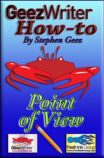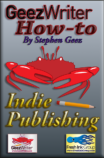This article’s writer, Lee Dickinson, pictured, is an advanced professional member of the Society for Editors and Proofreaders and the owner of bookediting.co.uk. You can read his blog here.
The 19 Biggest Fiction Writer Mistakes
Expert: Lee Dickinson

The 19 biggest fiction writer mistakes
Avoiding these errors is the easiest way to improve your book
1. Giving readers what they want
That anxiety when you read great fiction has been planted by a master manipulator. Clever writers toy with your emotions, keeping you reading. One way is by delaying resolutions. If you’ve set up a “Wow, what’s going to happen here?” moment, keep it simmering as long as possible. Readers will hate you, and love you.
2. Settling for imperfection
Writing’s about getting it right, not getting it right first time. Your first effort won’t be perfect, and leaving it like that is the lazy option. This isn’t a slur on your writing talent; D H Lawrence did at least seven drafts of The Rainbow. His hard work produced a novel with none of the results of lazy writing: cliches, adverbs, poor imagery, waffle.
3. Showing off
You’re probably a good writer; so good you need to show the world. Great. Keep that passion. But keep it tamed, because if your ‘brilliant writing’ takes over, your story will be ruined. Think of the best fiction you’ve read. What do you remember? Any verbose, flowery descriptions and sublime metaphors, or the crafted plot and compelling characters? Readers want stories, not egos.
4. Telling
“Jill’s attractive” or “Jack’s eyes bulged as Jill catwalked in”? You should show, not tell.
5. Bad plots
Even the greatest would struggle to write well about a string of business meetings, including the motorways, lay-bys and service station menus on the way there, or a retired spinster with an aversion to baking. You couldn’t make it up, but they (sort of) did. It’s interesting to the writer, usually because it happened to them. Before committing months or years to your book, is the plot worth it?
6. Bad characters
Characters should have character. Readers might spend hours with them, but only if they’re not a one-dimensional plot device. Would you spend time with a cardboard cut-out? Make them human; give them flaws, conflicts, a previous life. Focus on making your main character believable without stressing about likeability.
7. Bad grammar, spelling, punctuation
No excuses. A talented artist doesn’t slap paint around, so writers shouldn’t abuse words by ignoring the basics of their use. If you struggle here, get the best editor you can.
8. Static descriptions
It’s a book, so there’s lots to include, but your reader will lose interest if you stop the story to ‘info dump’. Avoiding this is vital at your novel’s start. Weave the essential details into the action instead, keeping at least one filmable element on every page.
9. Camera jerk
“Jack drummed his fingers as the wind howled outside. He thought about Jill’s blonde hair as the clock struck.” The writer directs the reader’s ‘camera’ and, here, it’s being directed at the fingers, then outside to the wind, back to Jack and his thoughts, then to a clock. Don’t do that, because you’ll confuse the reader. Keep the ‘camera’ smooth.
10. Voids
That ‘camera’ above can’t work if there’s nothing to film. Amateur writers often set chapters, even most of their books, in apparently featureless voids. Readers don’t need an inventory of interior decoration, but at least give them some broad brushstrokes showing where the action is.
11. Inconsistent view
Who’s telling your story, and where are they? Does a God-like storyteller have access to the thoughts of many characters, or is your main character recounting events after they happen? The latter won’t have access to anyone’s thoughts but their own, or knowledge of events they haven’t witnessed, so you can only include them from another point of view.
12. Weak chapters
Even entertaining or beautifully written chapters must move the story forward. Jack’s a funny main character, but he can’t enjoy a pub sesh with japester pal Bob while he should be saving the world. Pinpoint your weakest chapter. Ditch it. What about your next weakest?
13. Repetition
A wise editor explained this through bad maths: one plus one equals a half. Every repetition of the same point reduces its impact. Credit your reader with some intelligence, and save them time by making your one reference superb.
14. Lack of realism
Hollywood gets away with this, but you won’t. Sprinting through a house? Driving through a bridge crash barrier with a Chevrolet Volt? A previously quiet character having a chinwag which reveals essential plot points? You’re creating a new reality, so make it realistic.
15. Intrusion
“Jill trudged up the sun-baked hill, surely proving a global warming theory now backed by thousands of eminent researchers.” Your views matter, but not in your story. The ‘voice’ of your storyteller should also be consistent; readers will be confused if a discreet narrator morphs into a shock jock. Honestly, that happens.
16. Bad dialogue
Speech in your novels should be punchy and important. Don’t, for example, have phone calls agreeing the details of a meet, including the range of behind-bar snacks. Yes, that happens too. Silently arrange the meeting, briefly set the scene and focus characters on the main issue. Their exchange should be a tennis-like rally, each trying to win the point. If their ‘answers’ raise more questions, even better.
17. False starts
Most new writers start novels in the wrong place. They often introduce their main character and wait until that’s done before adding action or intrigue. Sometimes, a major event starts a novel, but we don’t know the main character it’s happening to, so the impact’s lost. For a gripping start, combine characterisation and action.
18. Wasting words
It is the best policy when you are writing properly to simply use as few words as is humanly possible. Or: writers should love words, not waste them? That’s seven words instead of 20. Using fewer words makes them more potent.
19. Being passive
You’ve made your characters interesting, right? Active? Do the same with your sentences. “The book was written by Jill” is better as “Jill wrote the book”. The change shifts the subject of the sentence from a book to Jill.







